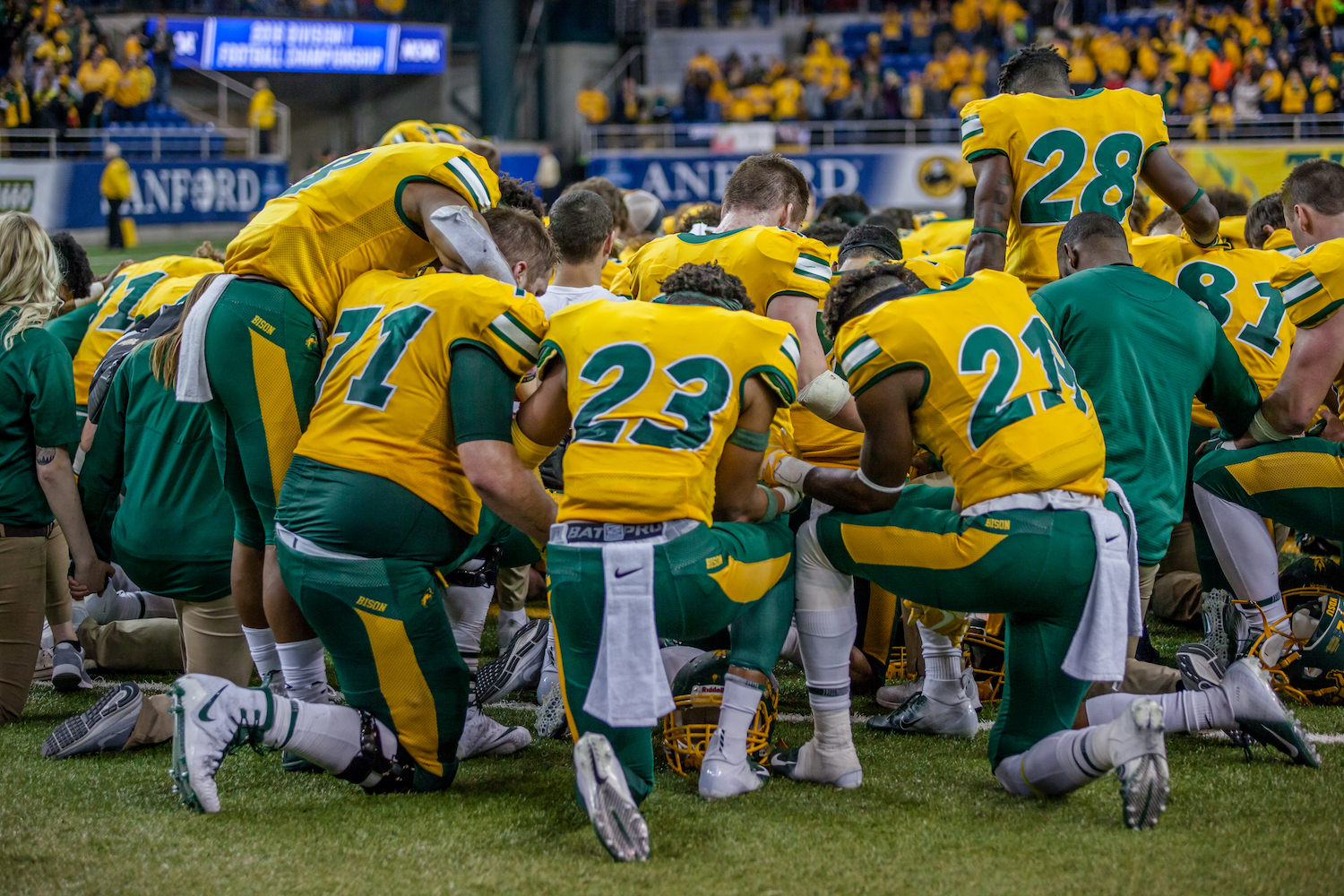Photo By Hillary Ehlen
It’s a question often asked of North Dakota State and its historic success. What’s the secret to this dynasty. How do you win seven national championships in eight years? With new coaches, players graduating, injuries and a plethora of high-caliber teams gunning for you each season, how in the name of hard red spring wheat do the Bison keep winning titles like John Wooden’s great UCLA basketball teams of the 1960s and mid-1970s, or Casey Stengel’s mid-century New York Yankees.
This question fascinates me. Harvard Business Review needs to do a case study and feature it in one of their quarterly issues. No other organization – sports or business – has been as successful as the NDSU football program this decade. Chris Klieman quipped last fall that if he knew the answer to this question, he’d bottle it up and sell it for millions of dollars. In fact, that’s sort of what he did in taking the Kansas State job. Gene Taylor and the rest of the Kansas State fan base is banking on Klieman applying the same formula to win championships in the Big 12.
There are underlying factors that have contributed to this championship run, a cornerstone that anchors the foundation. “Individual commitment to a group effort – that is what makes a team work, a company work, a society work, a civilization work.” Those words aren’t from a grand statesman. They’re from Vince Lombardi, one of the greatest coaches that ever lived. Lombardi was a leader, philosopher and thinker. When it came to understanding what made people tick, what motivated them and how to lead them to a shared goal, Lombardi was a genius. The legendary Green Bay Packers coach often preached about commitment from the individual for the team’s success. “People who work together will win, whether it be against complex football defenses or the problems of modern society.”
Individual commitment to a group effort. There’s a good starting point. No, it’s the panacea for our analysis. How do you get a group of individuals as diverse in their backgrounds and life experiences as a college football team, or, really, any organization, to buy into a repeated individual commitment for the team’s success? I mean really, really, buy in. Not just the clichéd “culture” speak we hear about at work retreats, in Jon Gordon books or at press conferences. You can’t teach that in a day, a week or at any conference. There’s a video floating around YouTube with dozens of coaches emphasizing culture. If it were really that easy, fewer coaches would be fired. Many say it, fewer understand it and even fewer can teach it.
That individual commitment to the team has a much-less appealing name. Sacrifice. Much can be learned from Lombardi beyond his throwback, “Winning is not a sometime thing, it is an all the time thing.” That quote is almost always taken out of context. The second sentence of this Lombardi-psalm is often ignored. It shouldn’t be. “You don’t do things right once in a while…you do them right all the time.” That was Lombardi’s foundation for his great teams. Today, we call this “the process.” Modern-day hype men didn’t invent “the process,” they’ve just invented an entrepreneurial-way to make a boatload of cash talking about it. What they’re saying isn’t new. It’s been around for centuries. You can even download it for free on your iPad. Search the Stoics. There’s a reason Nick Saban, one of the greatest coaches that ever lived, talks about Ryan Holiday’s book, “The Obstacles Is The Way.”
The roots of NDSU’s success, going back to the 1960s and the lessons imparted by guys like Denis “Izzy” Isrow, harkens to the ancients like Marcus Aurelius and Seneca. “Every habit and capability is confirmed and grows in its corresponding actions, walking by walking, and running by running…therefore if you want to do something make a habit of it,” said the Greek Stoic philosopher Epictetus in his Discourses. You’ve heard this described in much simpler terms as “Attack The Process.” That is why good coaches truly value and have heartburn over bad practices. Like wins, losses don’t just happen on Saturdays, they happen at practice. They happen in the little things, the seemingly insignificant minutiae details such as perfecting fundamental techniques, i.e., wrapping up and exploding with the hips when tackling, properly securing the football, or keeping a proper stance when blocking.
Saban takes heat, and undeservedly so, for saying things like this: “I know I get criticized for that. Everybody says, ‘He just won 31-3. What’s he complaining about?’ But it goes back to the inner scoreboard versus the outer scoreboard. Which one is more important? If you’re trying to accomplish your goals, it’s always the inner scoreboard.” If you’ve read the Stoics, you know why this was so critical for Lombardi and is gospel to Saban. Saban’s Alabama teams, like Lombardi’s Packers, win because they focus on doing things right, repeatedly, and not getting caught up in the “outer scoreboard,” or other’s perceptions of success. If Saban sees bad footwork from his defensive backs, it doesn’t matter what the score is, because that bad footwork could become a habit and cost his team down the road.
That’s the tougher part and challenge of the buy-in, convincing a group of individuals to be so laser-focused and committed to the “inner scoreboard,” of doing things right every practice, day after day, and not taking shortcuts, not going through the motions because, hey, we’re NDSU or Alabama. The Bison have mastered that. It’s ingrained into the very being of who, and what, NDSU is. During his introductory press conference in January, Bison head coach Matt Entz said, “I believe in who we are. The things that made our football program special will not change.”
To borrow from Lombardi, “The spirit, the will to win and the will to excel – these are the things that will endure and these are the qualities that are so much more important than any of the events themselves.”
That is the decisive factor, and we can all learn something important from that.










